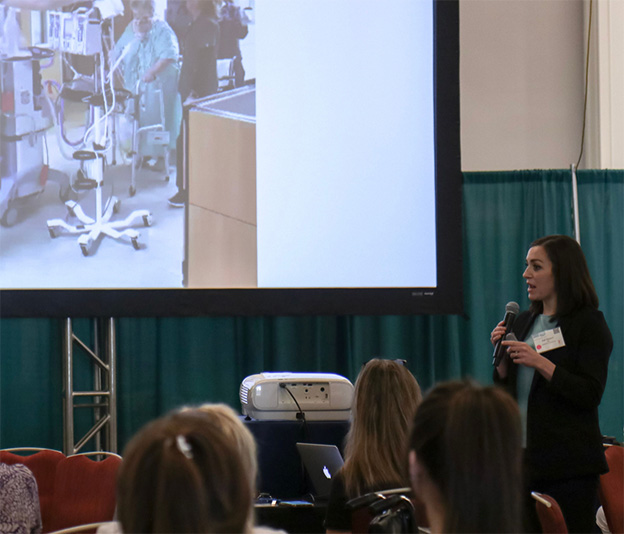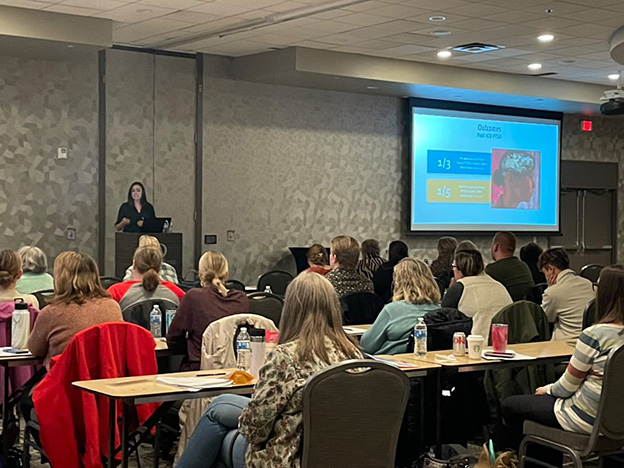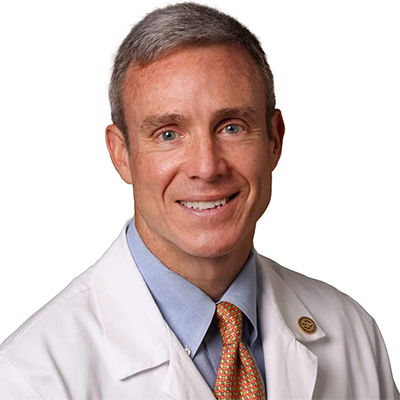Kali Makes The Research Come Alive
If you’re looking for an ICU patient care expert who can condense current research on delirium management and early mobility into a direct, down-to-earth presentation, look no further.
Kali is a passionate patient care advocate who takes a bold, unambiguous approach to this material, and is dedicated to addressing barriers to the standardization of evidence-based ICU practices.
By sharing her expertise across as many platforms and podiums as she possibly can, Kali seeks to inspire ICU clinicians around the world to do what’s best for themselves and their patients.
Kali has been featured in several publications, including:

Why Choose Kali?

From her Walking Home From The ICU and Walking You Through The ICU podcasts, to her webinars and speaking engagements, Kali has shown an unwavering devotion to improving ICU patient care around the world.
She’s worked in several ICUs, holds a doctorate in Adult-Gerontology Acute Care Nursing Practice, and is a member of the Society of Critical Care Medicine.
Years of experience as a nurse and nurse practitioner in an Awake and Walking ICU make her extremely well-versed in ICU delirium treatment, prevention and management, as well as early mobility in the ICU, and outcomes management.
Kali aims to help ICU clinicians of all disciplines understand the importance of mastering the ABCDEF Bundle and how they can go about doing that. She approaches ICU culture, challenges, and misinformation head-on to dispel myths about deep sedation and immobility.
Clinicians who attend her speaking engagements will leave with a deeper understanding of their role in creating an Awake and Walking ICU.
Kali can introduce this information to any audience in an engaging, emotive, and easy-to-understand format by using:
- Powerful visuals
- Poignant case studies
- Cutting-edge research
- Practical proposals for implementing these practices
- Real-world examples to highlight patients’ perspectives
Presentation Topics
How an Awake and Walking ICU Saves Lives
The realities of deep sedation and immobility for every patient on mechanical ventilation are clearly addressed. Research on ICU delirium treatment, ICU-acquired weakness, post-ICU PTSD, post-ICU dementia, prolonged time on the ventilator, and mortality related to sedation and immobility practices are applied to real case studies.
Pictures, videos, and case studies will demonstrate the drastic difference in outcomes seen in an Awake and Walking ICU to your audience. ICU team members will gain an understanding of the gaps in our ICU culture and practices and will have a shift in perspective on what is possible and what is vital when it comes to ICU patient care.
Delirium Management in an Awake and Walking ICU
This presentation addresses all the causes of delirium, as well as the risks of each common sedative used in the ICU. The financial burden and impact on outcomes of delirium are presented. Your audience will hear about the role of family and mobility in the prevention and treatment of delirium.
Videos from survivors of sedation and delirium show what it was like under sedation and what life with post-ICU PTSD and post-ICU dementia is like for them now.
Redefining Early Mobility in an Awake and Walking ICU
The history of bedrest, inter-organ connection between the muscles and other systems, and the impact of muscular atrophy on critical illness are shared. The effect of ICU-acquired weakness and diaphragm dysfunction on the rates of death, disability, tracheostomy, and time on the ventilator is revealed.
In this talk, your audience will hear about survivors who discuss their rehabilitation and the life-long impact of ICU-acquired weakness. Research on the safety, feasibility, and efficacy of early mobility is also shared. The science behind the benefits of each level of mobility is explained.
After participating in this presentation, ICU team members will understand mobility as a life-saving intervention. Clinicians will learn to prioritize prompt mobility as a part of best practices.
Outcomes Management in the ICU
In the maze of complications and chaos of critical illness, how can we prioritize interventions and care to optimize short and long-term outcomes?
How does our care today impact patients’ lives in the following weeks, months, and years? How can we structure our process of care to ensure patients have the best chance to survive and thrive?
We dive deep into leadership and outcomes management in the ICU in this presentation.
Interdisciplinary Collaboration in the ICU
Traditional ICU culture confines ICU clinicians to work separately in silos much to the detriment of patients and hospital systems. Awake and Walking ICUs require interdisciplinary collaboration.
In this presentation, we will discuss the vital role of each discipline in the ICU and how to most effectively work together to provide efficient, cost-effective, and optimal care.
Financial Benefits of the Awake and Walking ICU Approach
The current “normal” process of care for patients on mechanical ventilation that includes automatic prolonged deep sedation and immobility creates significant legal and financial liabilities for hospital systems.
Hospital-acquired complications, decreased reimbursements, disrupted bed flow, burdened workflow for staff, and preventable readmissions are increased when there is a failure to provide evidence-based practices in the ICU.
The financial benefits of delirium prevention and early mobility through protocols such as the ABCDEF Bundle are provided in this presentation.
Optimizing the ABCDEF Bundle for Each ICU Specialty
The ABCDEF Bundle is a guide to optimizing sedation and mobility practices individually for each patient. Even in exceptional cases in which patients may not be safe to be awake and/or mobile during their entire ICU stay, the ABCDEF Bundle is applicable to their care.
We’ll dive deep into how to appropriately choose sedation, and safely apply sedation vacations and early mobility in our diverse ICU specialties.
Protocolization of Humane Care
With a deep understanding of the “why” behind avoiding sedation and implementing early mobility, teams are now ready to discuss the protocolization of this process of care.
The founders of the Awake and Walking ICU, Polly Bailey, ACNP, and Louise Bezdjian, ACNP, will share details of the journey they took to master the principles of the ABCDEF Bundle and change ICU patient care outcomes. There will be multidisciplinary break-offs for respiratory therapists, physicians and advanced practice providers, registered nurses, as well as physical and occupational therapists.
Clinicians from each discipline will guide attendees towards understanding their role in becoming part of an Awake and Walking ICU. ICU clinicians will be empowered with tools to apply this research and understanding to their bedside practice.
The knowledge shared in this webinar will allow them to be confident in their ability to improve patient outcomes through evidence-based sedation and mobility practices.
Communication in an Awake and Walking ICU
Communication with patients on mechanical ventilation is a new skill set and process of care. This presentation discusses the benefits and techniques of using various methods of non-verbal communication.
This webinar will teach ICU clinicians to be comfortable communicating with patients on mechanical ventilation.
They will learn the impact communication has on patient outcomes and will be prepared to incorporate these forms of communication into their practice.
The Fear of Falls
ICU clinicians’ fear of falls contributes to them keeping patients in bed. In this presentation, the culture of safety and the true causes of falls in the ICU are dissected. The role of ICU delirium and ICU-acquired weakness in the incidence of falls is explored. Preventing falls as well as the risk and liability of caregivers through preventing ICU-acquired weakness and delirium is discussed.
The Truth About Unplanned Extubations
Culturally, sedation is believed to prevent unplanned extubations and keep patients “safer.” In this presentation, we will dive into the evidence to understand what is fact and what is myth about unplanned extubations. Tools to protect patients from the dangers of unplanned extubation while optimizing long-term outcomes are provided.
Sedation and Sleep in the ICU: Fact vs. Fiction
When patients are lying “peacefully” with their eyes closed while sedated in the ICU, are they “sleeping”? Kali dives deep into what is really going on from the patient’s perspective and in EEG monitoring. Participants will have a new perspective on sedation and the role sleep plays in surviving critical illness.
Spontaneous Breathing Trials
The ABCDEF Bundle decreases time on the ventilator. Sedation and immobility play significant roles in failed spontaneous breathing trials. In this presentation, participants will learn how to critically think through causes and treatments for failed spontaneous breathing trials to successfully extubate ICU patients.
Speaking Venues and Events
Presentation Settings
Kali is available to present in a variety of settings, including:
- Grand Rounds
- Medical Conferences
- ICU Team Meetings
- Hospital Administrative Meetings
Upcoming Appearances
May 28th-30th, 2025
June 29th-July 1st, 2025
Gerontological Advanced Practice Nurses Association (GAPNA) Annual Conference
September 11th-13th, 2025
Academy of Cardiovascular & Pulmonary Physical Therapy (APTA) 2025 Fall Conference
September 13th, 2025
Humanizing Critical Care Conference at University of California San Francisco
September 14th, 2025
Past Venues
- AACN Webinar Series
- Mayo Clinic Hospital
- Columbia University Hospital
- Penn State University
- Washington Health Hospital
- Inova Hospital System
- Mercy San Juan Medical Center
- University of Colorado Hospital
- Saint Louis University Hospital
- Sarasota Memorial Hospital
- Medical College of Georgia
- Hospital Universitario de Fuenlabrada
- VA Hospital System
- Meritus Hospital System
- Peace Health Hospital System
- Forrest General Hospital System
- St. Joseph Hospital, Intermountain Health
Past Conferences
NurseCon 2025
SCCM 2025 Critical Care Congress Sedation Debate
Early Mobility Panel Presentation with Dr. Wes Ely, Dr. Dale Needham, and Heidi Engel at CHEST 2024
Keynote Speaker: 2023 American Delirium Society Conference
World Sepsis International Congress
AACN NTI 2022 Conference
CHEST Conference 2022
Malaysia ICU Conference
Wales Intensivist Training Conference
AACN Greater Twin Cities Chapter Conference 2022
2022 Trauma Conference at SCL Health
AACN Portland Chapter Acute and Critical Care Fall Symposium
Central Minnesota Area AACN Chapter Conference
5th Annual Critical Care Symposium
TEAM Mobility Conference
55th Annual Illinois Respiratory Care Society Conference
Guest Appearances
- ACCRAC
- ACCRAC episode #2
- ICU Scenarios
- FreshRN Podcast
- Straight A Nursing
- Up My Nursing Game
- Osler Community
- Errxpodcast
- Radical Nurse Talk
- Mobility Minute
- Rmmd
- Tribe RN
- Patient Safety Movement
- Intensive Care Hotline
- Up My Nursing Game Podcast
- PT Meal Podcast
- ICU Life and Recovery
- Curious Professor
- Malpractice Podcast
- Thy Neighbor Podcast
- RT Sidebar
- Sickboy
- Visionary Nurse
- The Gabby U Show
- Good Nurse Bad Nurse
- Wound Care Karen
- Kwadcast

 When patients are so ill that they require a ventilator in the ICU, the antiquated approach of heavy sedation and immobilization should be avoided in order to help prevent the immense burden of physical and cognitive disabilities suffered during survival. To understand this better, listen to Walking Home From The ICU. You will see what ICU consultant Kali Dayton provides to your team.
When patients are so ill that they require a ventilator in the ICU, the antiquated approach of heavy sedation and immobilization should be avoided in order to help prevent the immense burden of physical and cognitive disabilities suffered during survival. To understand this better, listen to Walking Home From The ICU. You will see what ICU consultant Kali Dayton provides to your team.
